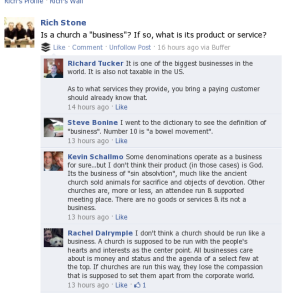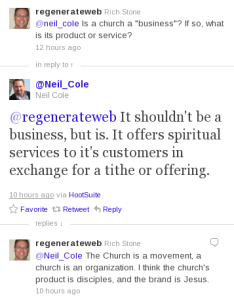I read this article by Neil Cole, author of “Organic Church” several other books, and it set off a chain reaction in my brain. Neil was reacting to the idea of church mergers and talking about whether the church is a “business”. I posted on facebook, a got a slew of reaction from both churched and unchurched friends.
I engaged Mr. Cole in a conversation on Twitter that went like this:
In the past I have written about “running the church like a business”. In my post on SystemsThinkingInMinistry I tried to describe what what diligent and intentional stewardship look like from a ministry leadership perspective, and in ArgumentsAgainstSystemsThinking I tried to defeat most of the lame or lopsided arguments against applying sound business management principles to optimize fruit production.
In this post I will try to tackle the question of whether the church is a business metaphorically. Please hang on, because the end will likely be surprising to you (It sure surprised me).
The Church vs. a church
The Church is a movement, started by Jesus over 2000 years ago. It is a movement that has thrived under persecution and survived apathy and poor human leadership. It started in Jerusalem and has grown until it has reached (literally) the ends of the earth. A church is an organization. It is a group of people who have banded together in the name of Jesus to accomplish His purpose as they understand it. They may have facilities, but a church is not a building. They may have events but a church is not an event. A church is people, organized for a purpose or mission. Businesses are organizations too. Hmmmm…
What is the product or service?
Every business has some product or service that it produces or provides or sells. If a church is a business what is its product or service? Mr. Cole appears to suggest that people are the customer, and that the church provides “spritiual services” in return for a tithe or an offering. Perhaps that is not his vision, but he is reflecting what he feels most people think. I think that the primary product of the church is disciples. Wait, what? How can disciples be a product – who wants disciples? Hmmm….
Who is the customer?
Who is the everlovin’ customer. Well, if I read my Bible right, it is God. He is the one who commissioned The Church to make disciples. We are His disciples, bought with a price. Wow. So we aren’t the customer of the church – therefore our disappointment or evaluation of the churches activities not so all powered important. We are not the one that the church has to please. Repeat after me: We are not the customer!
Are we branches, franchises, or competitors?
If we are one church, with one product, and one customer, why are there so many organizations? What are denominations, anyway? Are they branches of the “main office”, or competitors? I think that each church is a unique franchise, optimized to put the manufacturing facility nearest to the natural resources necessary to make the product. Natural resources? Seriously – what natural resources do we need to make disciples? Uh, people who aren’t disciples. So the church franchises itself, to get close to those who are its future product. How does that explain denominations? It doesn’t, other than with franchises, each location may vary a bit in manufacturing process, or organization due to variations in locally available materials. As long as the product is sufficient for customer satisfaction, why not? What about independent or “non-denominational” churches? Are they essentially one church denominations? Perhaps denominations are simply franchisee’s with multiple outlets. There are some limits to this analogy.
Creating Value as it applies to churches
In a recent post on one of my other blogs, I talk about our relationship to value creation (in a political-economic context). So what is our relationship to value creation in the church. We are both the product, and the means of production. We are the supply of raw materials, and the directors, managers, owners, workers and investors. In fact we (people) are responsible for every relationship to value, except customer. Since we are owners and investors, there must be some compensation, right, because we are in business – we aren’t doing this for our health, as they say. The dividend on our investment is immense, and our compensation and benefits are “out of this world”. Job satifsaction is incredible – it is one of the ONE best companies to work for for 2000 years. A friend of mine said that he thought God is the owner, and we are merely acting as stewards in his stead. But I think that God is really the Chairman of the Board, and we are all employees and stockholders. If we are in leadership, we are functioning as managers and stewards. God allows us to materially participate in the enterprise that he is operating in this world. So what about all the other activities that go on at church? Aren’t we sometimes the customer? Perhaps as disciples making disciples, we tend to find a church where our abilities and sensibilities fit the operating model – the disciple making process in place. If that is true, changing churches is more like changing jobs than shopping at a different store.
Branding and Marketing
In my post Ministry Branding I say this, as we as churches try to distinguish ourselves “in the market”, apart from each other, we somehow end up distinguishing ourselves from Jesus Christ, the true brand of The Church. To this, I now add, if God is our customer, and man our raw materials, why am I marketing to my raw materials? — Well, the reality of attracting people to the Gospel is work. In sharing the Gospel, we are really just helping to bring the raw materials to the manufacturing plant.
The competition
So how does the Christian Church stack up against the competition? Other religions do not share the same business model, although superficially, most monotheistic religions may appear similar. It would be interesting to do a series of comparative religion posts, by comparing the business model of different religions. In fact, that would be a real hoot.
Conclusion: I think that thinking of the church like a business is neither right nor wrong, the church existed long before “corporate business model” as we know it today. However, there have been businesses of one kind or another in every human civilization. It is however, an interesting lens to look at the church through. When we think of people as the “customer”, we clearly don’t understand God’s intention for the church. I feel that this is one thing that the evangelical movement has gotten wrong somewhere in the last 50 years – We don’t go to a church because we get what we need from it, we go to a church to become and to make disciples. Our goal as disciples, and as disciple makers is to please God, period. I’d like to say that the missional movement is getting it right, but what concerns me is that there appears to be a dilution of focus from disciple making to social projects that don’t have a clear relationship to value creation (making disciples). So Neil, if you see that church mergers are not a neutral business strategy, that is fine, you are speculating about the motivation of the stewards (leaders) of that/those franchises – but the metric that the Customer is focused on is making disciples, so if the merger improves production – either quality or volume, then I expect He will bless it.
I am sure that you all will find all kinds of holes in this analogy. I would love nothing better than for you all to add to or disagree with this post in the comments below. I have enjoyed writing this post more than any in a long time. Thanks to Neil Cole for starting the whole thing, and Bob Long for sharing his insight.


Interesting.
I think “business” has a bad rep these days, for good reasons. It might be more fruitful (relevant term, eh?) to talk about specific things like rational organization, continuous improvement, metrics, cmd&ctl vs. Agile, etc.
Re: who’s the customer? I understand your point about the ultimate customer, but in terms of getting customer satisfaction metrics, maybe this is like the situation where you’re creating software for use by clerical staff, etc., but you can only get feedback from management. The churchgoers, or the self-identified disciples, could be a reasonable surrogate.
Thanks for the comment Tom – the metrics and feedback would be very useful, but for a manufacturing process, you use different metrics – job satisfaction rather than customer satisfaction, and manufacturing throughput relative to supply (do I have supply piling up in the parking lot, because I can’t make disciples fast enough, or do I make disciples faster than I can acquire raw materials.)
Theologically, there is no limit or constraints around demand – the customer has paid in advance.
Manufacturing, eh? Okay – mental shift.
“Job satisfaction” – is that about employees’ feelings about their work situation? Because the other meaning of “job” – a one-off specifically ordered by a customer – wouldn’t seem to apply here, unless we’re getting into special revelation.
What about quality control? Presumably there would be some specs that could be tested against, but … Matthew 7:1….
Yes employees feelings about their work situation. Also, the manufacturing practice is somewhat medieval (pre-industrial) like craft and artisan work – so extremely subjective. Like sculpture – wholly dependent on the raw materials.
So here is the big conundrum. When people are raw materials, and then after manufacturing, they themselves become the “means of production”, there is continual “tooling” of these to specialize in areas of the value chain, or to adjust to variations in the raw materials. What this metaphor doesn’t reflect naturally is that discipleship is an ongoing process – towards a greater understanding of and alignment with the Customer (in this metaphor), and enhanced ability to participate in the process of making disciples. There is some effort expended by each individual towards continuous improvement, both individually, and across the franchise.
The metaphor is interesting, but it still comes way short of the reality. This metaphor completely fails to represent the supernatural influence of God in all aspects of value creation – and I only really intended as a different way to see the church as an operating entity, because in my experience, we (church attendees) often get too focused on the retooling rather than the manufacturing. We somehow think we are participating in the church for OUR benefit (edification) – but that really isn’t it at all, that is merely a side effect of our participation, not the purpose; and being human and selfish, we tend to get accustomed to it, to feel entitled to it, and ultimately to become dissatisfied with it, at which point the whole thing falls over and the enemy starts to gain ground.